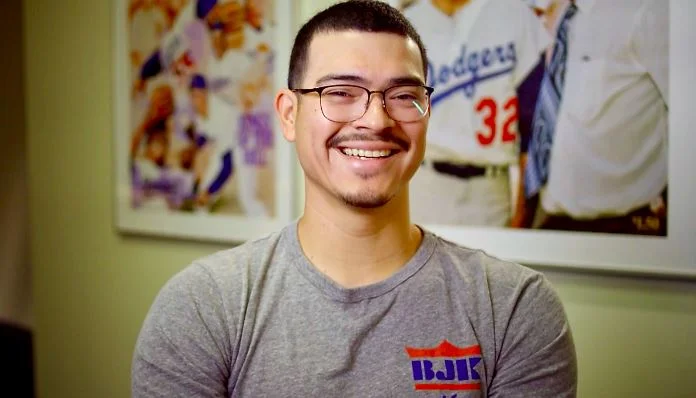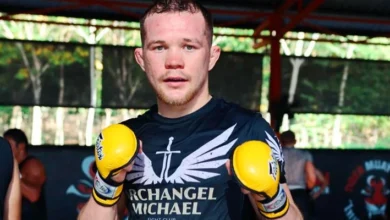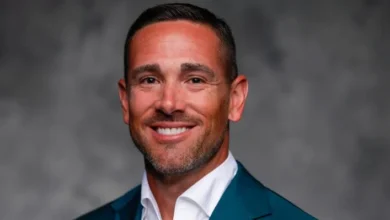
Anthony Banda Ethnicity and Parents Nationality
Anthony Banda is a professional baseball player who has made notable contributions in Major League Baseball (MLB). Known for his left-handed pitching, Banda has played for several teams, including the Tampa Bay Rays and the Milwaukee Brewers. Born with an impressive athletic background, his ethnicity and family heritage have often sparked interest among fans and sports commentators alike. Understanding the cultural influences that shape his identity provides a deeper connection to his story, as well as insight into his upbringing and career trajectory.
Anthony Banda Ethnicity and Cultural Background
| Category | Athletes |
|---|---|
| Full Name | Anthony Banda. |
| Birthdate | August 10 1993 |
| Birthplace | Corpus Christi, Texas, United States. |
| Ethnicity | Mexican-American heritage. |
| Father Ethnicity | Mexican-American heritage. |
| Mother Ethnicity | Mexican-American heritage. |
Anthony Banda’s ethnicity is a vital part of his identity, reflecting the rich diversity of his Mexican-American heritage. As a professional baseball player, his background has not only shaped his life but also the way he connects with fans and the broader sports community. His ethnic roots blend Mexican and American cultures, making him a proud representative of both worlds.
Anthony Banda Mexican Heritage
Banda’s father, a first-generation Mexican immigrant, passed down a deep connection to Mexican culture, traditions, and language. Growing up in a home where Mexican values were emphasized, Anthony was taught to respect and embrace his heritage. The influence of his father’s experience as an immigrant has shaped the way Banda views hard work, perseverance, and the importance of family. His Mexican roots are more than just a part of his identity—they represent the struggles, successes, and rich traditions of his ancestors.
In addition to his father’s influence, Banda’s family has maintained close ties to Mexico, frequently visiting and staying connected to their cultural origins. This connection has kept Mexican traditions alive in his life, from food and music to the language spoken in his home. Banda is fluent in Spanish, and this bilingual ability further deepens his bond to his Mexican background.
Anthony Banda American Identity
While deeply rooted in Mexican culture, Banda also embraces his American identity. Born in the United States, he is part of the Mexican-American community, which has been a defining factor in his development as an individual and as an athlete. Banda’s upbringing in Laredo, Texas—a city situated on the U.S.-Mexico border—allowed him to experience both cultures in a fluid and integrated way. His ability to navigate both Mexican and American cultural norms has helped him adapt to the fast-paced world of professional sports, where he is expected to interact with people from diverse backgrounds.
Living in the U.S. exposed Banda to the American way of life, including its sports culture, which became a central part of his life. His journey through baseball, from youth leagues to MLB, highlights the blend of his Mexican heritage and American opportunities. It also reinforces his understanding of what it means to be a Mexican-American athlete—a representation of the fusion of two cultures.
Anthony Banda Cultural Foundation and Personal Values
Banda’s pride in his Mexican roots is a reflection of the cultural foundation he received from his family. This foundation instilled in him a strong sense of family values, respect for tradition, and a deep appreciation for the sacrifices made by his parents and grandparents. As a professional athlete, he often speaks about the influence of his family on his approach to life and sport. Their emphasis on hard work, resilience, and staying connected to one’s roots has shaped his personal and professional philosophy.
Moreover, growing up with a bilingual and bi-cultural perspective has given Banda a unique outlook on life. It has fostered a sense of responsibility to represent the Mexican-American community in the world of sports, where such representation is still evolving. In a field like baseball, where Latin American players are growing in numbers but remain underrepresented in certain aspects, Banda’s ethnicity and cultural background provide a valuable role model for young fans and aspiring athletes of Mexican and Latino descent.
Anthony Banda Cultural Representation in Baseball
Banda’s Mexican-American identity resonates strongly in the baseball community, especially as more Latino players are making their mark on the sport. Baseball, historically dominated by players from the United States and other countries, has seen a significant rise in athletes from Latin America in recent decades. As a Mexican-American, Banda is part of this growing movement, bringing visibility to Mexican culture within the sport.
His journey as an athlete is particularly important because it reflects the diversity that continues to shape Major League Baseball. For many Latino and Mexican-American fans, seeing players like Banda succeed provides inspiration and pride, reinforcing the idea that ethnic and cultural backgrounds are strengths that contribute to the fabric of American sports. Through his performances, Banda embodies the pride of the Mexican-American community, making him a symbol of both cultural pride and achievement in the competitive world of baseball.
Anthony Banda Siblings
Anthony Banda, the professional baseball pitcher, hails from a family that has supported him throughout his career. While his professional achievements are often in the spotlight, his family life, particularly his siblings, plays a crucial role in his personal journey. Although not much is publicly known about all of his siblings, some information about them highlights the close-knit family environment that has shaped his character and success in sports.
Anthony Banda Sibling Relationship
Anthony Banda comes from a family with siblings who have always been supportive of his career and personal life. While details about his siblings’ personal lives remain relatively private, it’s clear that family is an important part of Banda’s life. Growing up in Laredo, Texas, his siblings shared in his experiences, providing him with the emotional support needed to pursue his dreams. His family dynamic allowed him to thrive in the competitive world of baseball, and his siblings have played an important role in his continued success, both on and off the field.
Anthony Banda Supportive Family Environment
Though Anthony Banda’s siblings may not be as publicly known, the role of family in his upbringing cannot be understated. The Bandas are a close-knit family, and Anthony has often credited his parents and siblings for instilling strong values of hard work, perseverance, and dedication. His upbringing in a supportive family environment helped cultivate his drive to succeed in professional sports. Whether it’s through attending games or offering encouragement from home, his siblings are undoubtedly part of the foundation upon which he has built his career.
Anthony Banda Professional Career
Anthony Banda’s professional baseball career has been marked by resilience and perseverance, with notable moments that have demonstrated his talent and potential on the mound. Known for his fastball, slider, and ability to generate strikeouts, Banda has worked his way up from the minor leagues to Major League Baseball (MLB). Despite facing challenges, including injuries, his journey serves as a testament to hard work and determination. Banda has played for several MLB teams, including the Tampa Bay Rays and the Milwaukee Brewers, showcasing his skills and versatility as a left-handed pitcher.
Anthony Banda Minor League Beginnings
Anthony Banda’s journey to the major leagues began in the minor leagues, where he quickly made a name for himself. The Arizona Diamondbacks selected him in the 10th round of the 2012 MLB Draft. Initially, he played for the Rookie-level Missoula Osprey and later moved through the Diamondbacks’ minor league system, making stops with the South Bend Silver Hawks, Visalia Rawhide, and Mobile BayBears.
Banda’s rise through the minors was marked by his impressive strikeout rate and steady development. His fastball, consistently in the low 90s, combined with his slider, became his primary weapons, allowing him to excel against hitters at various levels. His ability to maintain control and strike out batters earned him recognition as one of the top pitching prospects in the Diamondbacks’ system.
Anthony Banda Major League Debut and Trade to Tampa Bay Rays
Banda made his MLB debut with the Arizona Diamondbacks on June 24, 2017. He faced the Atlanta Braves, and though his time in the majors was brief, his debut marked the culmination of years of hard work in the minors. Banda’s first MLB appearance saw him pitch 2 2/3 innings, striking out four batters, showcasing his potential despite the small sample size.
However, after making a few more appearances with the Diamondbacks, Banda’s career took a significant turn when he was traded to the Tampa Bay Rays in 2019 as part of a deal that involved several players. With the Rays, he continued to develop and appeared in several games. Banda’s time with Tampa Bay included stints in both the majors and the minors, where he worked on refining his skills and adjusting to the higher level of competition in MLB.
Anthony Banda Injury Struggles and Recovery
Like many professional athletes, Anthony Banda’s career has been impacted by injuries. In 2020, Banda faced a significant setback when he underwent Tommy John surgery, a common procedure for pitchers recovering from elbow injuries. This put a halt to his major league appearances, and he spent the following year recovering and rehabbing to return to form.
His determination to return to the mound after the surgery was a defining part of his journey. Banda’s resilience during his recovery was a testament to his work ethic, as he battled through the long rehab process to rejoin the MLB circuit. In 2021, he made his return to the majors, this time with the New York Mets, as part of a recovery effort to rebuild his career after the injury.
Anthony Banda Playing for the Milwaukee Brewers and Beyond
In 2022, Banda signed a contract with the Milwaukee Brewers. With the Brewers, he hoped to secure a regular spot in the bullpen. His ability to adapt to various pitching roles, whether as a starter or reliever, has been one of his key assets throughout his career. His time with the Brewers has provided him with more opportunities to showcase his talent in high-pressure situations, with Banda continuing to evolve as a reliable left-handed pitcher capable of contributing to a major league roster.
Anthony Banda Career Outlook
As of now, Anthony Banda’s career trajectory remains promising despite the hurdles he has faced along the way. His experience across several MLB teams has provided him with the versatility to take on different pitching roles, whether as a starter or a reliever. With his recovery from injury and continued development of his pitches, Banda is a valuable asset to any team in need of a left-handed pitcher with potential to contribute both in the bullpen and as a starter.
While his journey hasn’t always been smooth, Banda’s persistence, skill, and dedication have kept him in the conversation as a major league talent. His professional career reflects the unpredictable nature of baseball and the personal growth that can emerge from overcoming adversity.
Anthony Banda Parents Nationality
Anthony Banda’s upbringing was deeply influenced by his parents’ nationalities, each bringing a unique perspective to his life. Born in Laredo, Texas, a city renowned for its close proximity to the U.S.-Mexico border, Banda’s environment was a melting pot of American and Mexican cultures. His father, originally from Mexico, moved to the United States in search of better opportunities and to build a future for his family. This decision was driven by the desire to embrace the American dream, and it allowed Banda’s family to live within a community that valued both Mexican traditions and American values. His father’s migration story is one that resonates with many Mexican immigrants who moved to the U.S. in the hopes of a better life, and it instilled in Banda a sense of hard work, resilience, and ambition.
Banda’s mother, who is of Mexican descent, shared a similar cultural background, further reinforcing his connection to his Mexican heritage. Growing up with both parents’ influences, Banda was raised in a household where Mexican traditions, language, and customs were valued and celebrated alongside American ideals. This blend of Mexican and American values shaped his identity, offering him a unique advantage in understanding the complexity of cultural duality. It allowed him to proudly represent both his Mexican roots and his American upbringing, fostering a strong sense of pride in his heritage as he pursued his baseball career.
Conclusion
Anthony Banda’s ethnicity and parents’ nationality are integral to his identity, shaping not only his character but also his approach to life and sport. Growing up in a Mexican-American household in Laredo, Texas, Banda was immersed in a blend of cultures that emphasized family values, hard work, and perseverance. His father, a first-generation Mexican immigrant, instilled a deep pride in his Mexican heritage, while his mother’s own background as a Mexican-American contributed to a sense of belonging in both Mexican and American communities. This cultural fusion gave Banda a unique perspective on the world, fueling his ambition and determination to succeed in professional baseball.
In the competitive world of sports, where athletes from diverse backgrounds often face challenges related to identity and representation, Banda’s story stands out as a beacon of resilience. As a Mexican-American athlete, he embraces both his cultural roots and his role as a representative of the growing Latino presence in baseball. His success is not just about his athleticism but about breaking barriers and showing that one’s background can be a source of strength. Banda’s journey reflects the power of family, heritage, and cultural pride, offering an inspiring example for future generations of athletes to follow in navigating their own paths to success.



